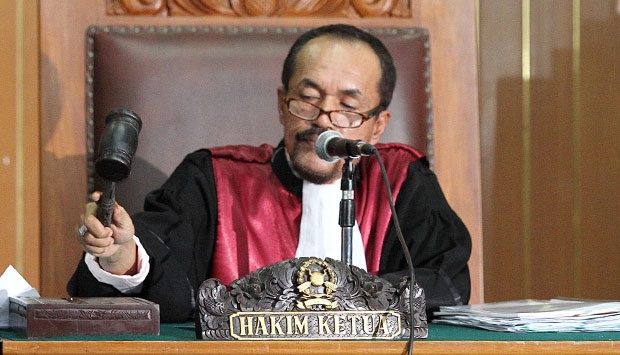
TEMPO.CO, Jakarta- The Supreme Court should reject the recommendation of the Judicial Commission on the punishment for South Jakarta District Court judge Sarpin Rizaldi. The judge, who ruled in favor of the plaintiff in the pretrial suit filed by Police Comr. Gen. Budi Gunawan, was found to have breached the judicial code of ethics and conduct. The penalty handed down Sarpin by the commission, a six-month ban on presiding in court, was lenient.
The commission exercised its authority according to Article 13 of Law No. 18/2011. It upheld the code of ethics and did nothing to intervene in the substance of the ruling, which was also problematical.
At the pretrial hearing, for example, Sarpin was seen to have exceeded his authority because he ruled on a matter that should have been decided during the actual trial.
It is clearly the responsibility of the Supreme Court to rule on unusual verdicts. Sarpin's decision to revoke the criminal indictment of Budi Gunawan by the Corruption Eradication Commission (KPK) resulted in legal chaos. The Criminal Procedures Code was not followed because at the time, indicting a suspect was not grounds for a pretrial hearing. As a result, alleged corruptors flocked to the courts to file similar pretrial suits.
It was while looking at the code of ethics that the Judicial Commission uncovered the breaches committed by Sarpin when he chaired the pretrial hearing and when he responded to criticism afterwards. The commission stated that Sarpin had not been professional when he presented his considerations prior to his ruling. He misquoted Parahyangan law professor Arief Sidharta when he read out his decision. He also mistakenly referred to Arief as an expert in criminal law, instead of an expert in legal philosophy.
After he announced his ruling, Sarpin was accused of unethical conduct for his public response. He reported several people who had criticized him to the police. According to the commission, a judge should be neither happy nor angry in response to comments on his or her rulings. Then there was the gratuity violation. Sarpin was suspected of having received free legal services from an attorney's office.
The commission had very good reasons to take away his gavel for six months. The testimony of 10 witnesses was more than enough, despite Sarpin's refusal to attend the ethics hearing. Instead of taking the opportunity to clarify the charges against him, Sarpin chose another move, and filed a complaint against two commission chairmen. This was within his rights, but should not have been done. Sarpin's refusal to attend the ethics hearing only reinforced the suspicion that he had no strong arguments to counter the charges against him.
Now that the commission has made its recommendation, the ball is at the Supreme Court. We hope that this time the highest court in the land will reject the commission's recommendation, as it did in 2013. At that time, the Judicial Commission recommended the court punish 115 judges who had been found guilty of ethics violations, but regrettably, the court only sent seven of them to appear before the Judicial Ethics Council.
Clearly, the Supreme Court needs to improve the performance of judges. If it does not agree with the Judicial Commission's recommendation, it can use the provisions in Article 22-E of Law No.18/2011 to launch a joint investigation in order to determine the punishment. The court must realize that there must be serious measures in upholding ethics to restore the much-eroded public trust in the credibility of judges. (*)























